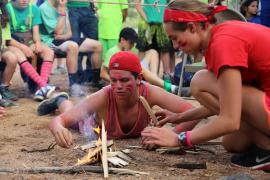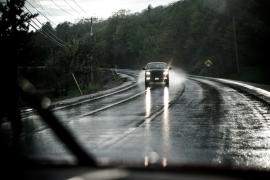As you are working at camp, here are three thoughts to help you make sure you are getting the most out of your experience as a camp counselor.
First, Reinvent Yourself
Camp is a place where many campers get a "fresh start." Not only do they get to try out new activities and develop new skills, but they also get to try out new ways of being, like making new friends, speaking up more, and so on. I have seen campers who have virtually reinvented themselves at camp. For example, at a boys sailing camp on Cape Cod, I once witnessed a shy high school student discover and develop his hidden talent for sailing, which made him a hero at camp and afforded him a kind of status and popularity he had never experienced at home. Camp is, after all, a place where you as a counselor can encourage your campers to take healthy risks, like trying out for the play, going down the zip line for the first time, or going on a rafting trip, to name just a few.
So what about applying that same spirit of exploration and change to yourself? If you tend to make friends with certain kinds of people, why not branch out and try getting to know someone new on staff? If you tend to be shy, what kind of healthy risk can you take to create new friendships or be more assertive? If you've never tried sailing or some other activity at camp, what about making a pact with your friends to try it out? What about finding a new way to have fun or take a break other than partying? Could there be camp-related activities you could get the director to give you and other counselors permission to do as an alternative to a usual day-off itinerary?
Camp is often a place where people expand their horizons. Doing the same this summer might make for a very different experience and open up an entirely new part of your personality.
Second, Go To Sleep!
Most camp counselors today are sleep deprived. OK, I can't prove it. It's just that I constantly hear young adults complaining about how tired they are. In fact, if there is one trend I have seen in kids of all ages, extending well into college years, it is that everyone seems to be getting less sleep!
The National Sleep Foundation tells us that 60 percent of all high school students report having extreme daytime sleepiness in school and that 25 percent of them say a lack of sleep has caused a significant drop in their grades. Between 20 and 33 percent of high school students fall asleep at least once a week in class. Sleep deprivation probably only gets worse once you are in college, pulling "all nighters," surfing the Web, catching up on your Facebook® time, and socializing at all hours of the night.
We have always known sleep was important, but until recently, we didn't know exactly how important it was or in what ways even just a little less of it affected us. For example, college students who get As get an average of fifteen minutes more sleep every night than those students who get Bs, who in turn get an average of fifteen minutes more sleep every night than students who get Cs. A lack of sleep is now clearly associated with loss of memory, poor learning, greater impulsivity and inattention, and even weight gain. Yes, that's right — weight gain. And we're not talking about lean muscle here! Let me explain.
It turns out that your brain transfers what it has learned each day from short term memory to long term memory in what sleep researchers call "stage 3" or "slow wave" deep sleep. Children spend up to ten times more time in stage 3 sleep than adults, probably because they've got a lot more to assimilate in their early years. Motor memory — like tennis, swimming, gymnastics, dance, or another athletic skill — gets processed in stage 2 sleep. Events of the day that are emotional or stressful get processed in REM stage sleep associated with dreaming. Less sleep means you end up dumb, numb, and an emotional stress mess! At camp, the better rested you are, the more alert, calmer, and less stressed you will be in your work with campers. Given the tremendous responsibility counselors have of caring for other people's children, camp is no place to be short on sleep!
So what about weight gain? Sleep loss increases the brain chemical ghrelin, which stimulates our appetite and decreases the hormone leptin, which suppresses appetite, while also increasing the stress hormone cortisol, which tells our bodies to make fat. Studies have now shown conclusively that kids who get less sleep can have a 300 percent greater chance of being overweight than kids who get more sleep. (If you want to read more about this, check the book Nurture Shock by Po Bronson and Ashley Merryman.) For every hour of sleep you lose, you have an 80 percent greater chance of gaining weight!
If you are typical of most counselors, you come to camp tired after finishing finals at school and then pack in as much time with your non-camp friends as you can before arriving at camp for orientation dog-tired. We know that 100,000 car accidents occur each year because of a driver falling asleep. Sleep-deprived teens and young adults cause 50 percent of them. Imagine how much less of an "accident-waiting-to-happen" camp would be for you as a counselor — how much better the experience would be overall — if you got more sleep!
Third, Teach Yourself to Hear Constructive, Critical Feedback
One of the most difficult things for anyone interested in learning and growing is accepting critical feedback. Many of us get defensive or feel threatened when others try to point out an aspect of our performance or behavior that could be improved. While this knee-jerk reaction is common, it's unfortunate. Taking critical feedback can help you grow. Even in cases where you feel unjustly criticized or judged, if you can get past the initial blow to your pride, you may often find there is a kernel of truth to what has been said to you even in haste or anger. Research tells us that the most successful leaders are constantly assessing and improving their own behavior. I know my own work with young people rests on the many teachers and mentors who went before me. The work with campers can be demanding and challenging. Your performance will only improve from the pointers you can take in from those around you. Teach yourself to listen more openly and you will benefit.
Have fun this summer. If you try some new things, get enough rest, and take in the good advice of those around you, it may even change your life!
References
Bronson, P., & Merryman, A. (2009). Nurture shock. New York: Twelve, Hachette Book Group.
National Sleep Foundation. (2004, 2006). Sleep in America studies. Washington, DC.
National Center on Sleep Disorders. (2005). Sleep studies in adolescents and young adults. Pediatrics, 115(6), 1774 – 1786.
Bob Ditter is a licensed clinical social worker specializing in child, adolescent, and family therapy.
Originally published in the 2010 July/August issue of Camping Magazine.


